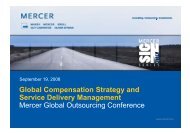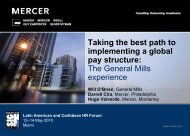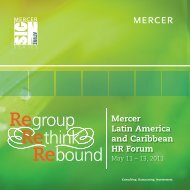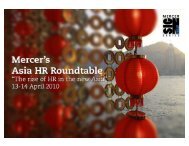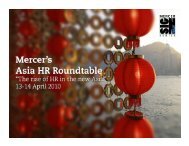A SERIES OF ARTICLES FRoM THE 2011 EMEA CoMPENSATIoN ...
A SERIES OF ARTICLES FRoM THE 2011 EMEA CoMPENSATIoN ...
A SERIES OF ARTICLES FRoM THE 2011 EMEA CoMPENSATIoN ...
Create successful ePaper yourself
Turn your PDF publications into a flip-book with our unique Google optimized e-Paper software.
COMPENSATION AND BENEFITS IN ASIA PACIFIC<br />
So the broad pay bands with narrow ranges that are<br />
typical of Western pay schemes do not work in<br />
developing markets. Companies need to use broader<br />
ranges – often double the amount between the<br />
minimum and maximum salary in a grade or role. Also,<br />
people need to be promoted more quickly and have<br />
more frequent pay rises than are common in<br />
developed markets.<br />
Talent development<br />
When using compensation and reward programmes to<br />
help develop talent in developing markets, companies<br />
need to start from the bottom up and must understand<br />
the nature of the market in which they are operating.<br />
Most global leadership and talent development<br />
programmes start from the wrong place, focus on the<br />
wrong “gaps” and focus on the process rather than the<br />
intent.<br />
For example, competency models tend to assume<br />
individuals at the same level will share a common<br />
profile. But people of equivalent level in different<br />
countries may have very different strengths and<br />
weaknesses. A key requirement of a manager in China,<br />
for instance, is the political nous to deal with local<br />
government officials – a skill way beyond the ken of a<br />
typical UK manager. Likewise, a UK manager might be<br />
adept at doing employee evaluations, but the Chinese<br />
equivalent would struggle to have challenging<br />
discussions with his or her direct reports.<br />
What’s more, employees in different countries place<br />
different values on different elements of reward.<br />
In India, for example, career advancement takes<br />
precedence, followed by base pay and then training<br />
opportunities. In Australia base pay comes first, and<br />
then type of work and a flexible work schedule. In<br />
China employees are most concerned with career<br />
advancement, with base pay and retirement savings<br />
plans ranked second and third. And in both Hong Kong<br />
and Singapore the order is base pay, bonus/other<br />
incentives and career advancement.<br />
Companies have to understand and accommodate<br />
such differences rather than taking a Western<br />
perspective and forcing “global” practices on local<br />
markets. If they don’t, their compensation and benefits<br />
programmes in developing markets won’t deliver a<br />
return on investment. They need to be designed from<br />
the bottom up and take account of the facts of the<br />
individual market concerned.<br />
Paul O’Malley leads Mercer’s Information Products Solutions business in Asia Pacific.<br />
Based in Singapore, he can be reached at +65 6222 5792 or paul.o’malley@mercer.com.<br />
29 27




